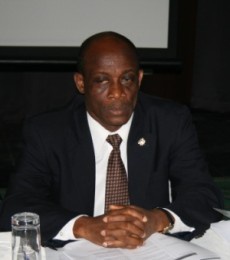- Home - News
- TWI News | TV
- Polls
- Year In Review
- News Archive
- Crime & Punishment
- Politics
- Regional
- Editorial
- Health
- Ghanaians Abroad
- Tabloid
- Africa
- Religion
- Election 2020
- Coronavirus
- News Videos | TV
- Photo Archives
- News Headlines
- Press Release
General News of Monday, 9 December 2013
Source: IMANI- GHANA
Budget 2014: Worrying Perspectives from IMANI Ghana

Ghana’s Parliament concluded its debate on the budget statement presented by the government. Sadly, and yet again, the jarring noise that usually attends such debates left may crucial factors unnoticed, yet the budget passed.
Notice, the budget statement for 2014 has been presented with a bold theme, “Rising to the Challenge: Re-aligning the Budget to meet Key National Priorities” yet it would seem that the budget falls short of its own goals.
Although the budget claims it reflects a realignment of budget allocations to reflect the nation’s development agenda, it leaves much to desire when one considers some of the things that the government deems re-alignment. For starters, imagine that the budget highlights the signing of a contract to deliver hand-pumps as an achievement, when the Ministry of Water Resources, Works and Housing had promised to fit over 1600 boreholes with hand-pumps by 2013 year end. Should it take a whole year to sign a contract?
Then, why should an administrative sector such as the Ministry of Information & Media Relations receive GHS100,120,293 while Ministry of Transport, an infrastructural sector, is receiving GHS89,949,128? This appears misguided. Similarly, the Ministry of Foreign Affairs’ GHS153,953,629 allocation for 2014 is too high. Besides the facilitation of visits and participation of workshops to integrate Ghana into the international community, the Ministry’s only other highlighted achievements, purportedly it’s most important, is the setting up of passport offices in 6 regions on a budget of GHS 110,229,048. The only concrete reported agenda for 2014 is the facilitation of conversion of all passports to biometric by 2015 by setting up additional offices in the remaining 4 regions. Having delivered a project of a larger scope and on a smaller budget the year prior, the Ministry of Foreign Affairs should have received less money this year. In any case, shouldn't the Passport office be able to generate enough money through the sale of the biometric passports to support these measures? Are these passports free? How much has the office generated since we went biometric, and what has the money been used for?
The audit service was allocated GHS 119, 115, 792 in 2014 while it received GHS 51, 552, 918 in 2013. This represents a 57% increase. A review of the activities for 2013 and projections for 2014 appear very similar with no visible extension of role to warrant the 57% increase in allocation. Ministry of Fish and Aquaculture received an allocation of GHS 128, 617, 836 in 2014 vs. an allocation of GHS 48, 336, 230 in 2013. In addition to the legal and administrative roles, in 2014, the Ministry will undertake the construction of Fisheries College at Anomabo and the construction of the Turnkey Fish Processing Factory at Elmina. Within the scope of the country’s debt and the constraints on budget, non-essential infrastructural developments may not be smart at this time.
According to the Budget Statement 2014, the Ministry of the Interior seems to have less planned for 2014 in comparison to its 2013 performance and outlook. Hence it would seem to be able to do without the 22.6% budget increase from GHS 825,817.169 to GHS 1,013,251,214.
According to the Budget Statement 2014, the Office of Government Machinery is receiving an increase of almost 12% to its budget allocation. However, it would seem that some of the functions this agency intends to take on could be done by other MDAs. For example, scholarships for second cycle students and students studying abroad can be administered by the Ministry of Education. Hence it would seem that this budget could be reasonably decreased.
From the Budget Statement 2014, that National Council for Civic Education does not appear to have planned a significant increase in activities to warrant a 45% increase to its operating budget.
There are policy initiatives that overlap between multiple MDAs, for which it is unclear where funds for each initiative are deposited. For example, both the Ghana Prisons Service and the Ministry of Education indicate that they will undertake formal education training for inmates, yet none explicitly mentions cooperation with the other. It is unclear then, which of the MDAs is responsible for financing the project.
While many MDAs make no compelling case for the size of their oversized allocations given their 2014 agendas, others whose work is key to development by building necessary infrastructure, and who could clearly do with more funds are seeing substantial budget decreases:
Water Works, Sanitation and Housing has received a budget cut of about Gh¢60million yet it seems prima facie, from the arrears in work they plan to carry over into 2014, as well as additional projects that they plan to undertake, that they need more than they have been allocated for the year. And of course, the importance of this infrastructure-minded ministry would make us hope that it receives priority consideration against some of its peers. However, this does not seem to be the case. Meanwhile, although there has been no indication in a dramatic change of purpose for funds allocated to the District Assemblies Common Fund, the fund has seen a hefty drop in budget allocation of about 99%, from Gh¢1,149,286,950 to Gh¢311,833 for 2014. It is likely that the large budget cut will greatly impair the abilities of District Assemblies to do meaningful work in 2014.
These are but a few of several instances of misguided allocations strewn throughout the budget statement.
Sadly, the poor re-alignment of goals does not seem to end at this web of questionable budget allocations. Hon. Seth Terkper has said “Ghana’s lower middle income status has taken a toll on the country’s ability to borrow on soft terms thereby delaying key infrastructural projects. As a middle-income country, some of the sources from which we borrow on very soft terms are no longer available to us. They are dwindling”. There is definitely some truth to Mr. Terkper’s complaint; if we ourselves do not have enough money to invest in infrastructure despite our upgraded status yet face harsher terms and conditions for external financing, surely there is cause for concern. Yet what is perhaps more disconcerting is the troubling philosophy of development that it reveals our country’s leadership to have. Take a look at the strange allocations highlighted above, couple it with the Finance Minister’s complaint about inability to borrow loans, and it appears that we continue to look to external funds to develop the infrastructure key to strengthening the engines of growth and development, instead of putting those funds that we ourselves have towards it. Surely we can do a better job of re-aligning our policies and goals to reflect these commitments.
Meanwhile, the World Bank has recently reported that “over US$1.5billion of funds - out of US$2.3billion” total approved loans to Ghana “remains in the World Banks chest, waiting on implementing agencies to get their acts together. World Bank officials say [that] lengthy administrative processes [on the Ghanaian side] have accounted for the delays in the implementation of the projects. In other cases, compensation payments which are supposed to be borne by the government of Ghana tend to delay project implementation.” We are not only complaining about our inability to access money on softer terms instead of managing our ‘improved’ economic status to our advantage, but most of the money we have gotten on soft terms has not even been touched!
Speaking of money for investment projects, what has happened to the Petroleum revenues? According to the Public Interest and Accountability Committee (PIAC), the Ministry of Finance cannot properly account for their use of 2012 revenues. For what we can track, the money has been misused in flagrant disrespect for the laws that govern these funds. PIAC says, “it [has] observed another expenditure allocation schedule which was different from what parliament had approved.” Whilst parliament approved a schedule that allocated GHS 100 million to Expenditure and Amortization of loans for oil and gas, GHS 232 million to Road and Infrastructure, GHS 72million to Agriculture Modernization and GHS 112 million to capacity building (a total of 4 areas), the Minister of Finance allocated the funds to 13 areas, among which GHS 113 million was given to Administration, GHS 130million to Ministry of Energy, GHC 70million to Ministry of Transport and GHS 22 million to Ministry of Sports. “The allocations if actually spent will amount to consumption spending” instead of the investment spending indicated in the law.”
Read through the budget and look for what has happened to the revenue from the Communications Service Tax. You would be as lost as I am in figuring out how much we received and what it has been used for.
In fact, the budget statement is full of underwhelming progress reports and depressing revelations of how little our government has achieved in a year. It also shows us that we have a long way to go from the budget 2014 if our leaders truly are interested in living up to the theme they have themselves prescribed for our 2014 outlook. A refocus towards prioritizing expenditure on key sectors (Water, Health, Energy and Transport), investing sincerely in infrastructure, and demanding concrete and substantial progress on each goal need to take the lead in designing Ghana’s budget if we are truly interested in development.
IMANI’s Female Research Assistants Adwoa Banful, Ann Amenuvor and Maud Martei put this together.










